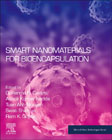
Smart Nanomaterials for Bioencapsulation
Castro, Guillermo R.
Nadda, Ashok Kumar
Nguyen, Tuan Anh
Sharma, Swati
Gupta, Ram K.
Bioencapsulation of food and drug derivatives is one of the promising approaches in modern pharmaceutical and nutrition science. The target delivery of pharmacological agents, as well as food additives under various conditions, requires the use of nanomaterials with particular properties. In this context, the systemic release of drug molecules, with minimum loss at non-target sites, also enhances the accumulation of diseased tissue or organs. Several smart nanomaterials have already been employed, to ensure the bioencapsulation of therapeutic drug agents, which results in enhanced specificity, efficiency, and speedy recovery from pathological conditions. Smart nanomaterial-based nanocarriers protect the loaded molecules from premature degradation in the biological environment and enhance bioavailability for cellular uptake. The tuned properties of smart nanomaterials, such as porosity, pore-volume, surface area-to-volume ratio, coating with inert and labile materials, which degrade easily in the cellular compartment, determine the in vivo performance of the bioencapsulated food and drug derivatives. This book focuses on the fundamentals, synthesis methods, and matrix design for the encapsulation of drugs, drug release, food and nutraceuticals, mechanisms of nano- encapsulated drugs on liposomes, micelles, silica composites, carbon nanotubes, dendrimers, and protein inorganic nanohybrids. The delivery of genes, protein molecules, and antibiotics, through various advanced computer modulated techniques, will be discussed. The comparison between synthetic and biosynthetic systems, the potential of smart hybrid systems of nanoencapsulation will be highlighted in this book. The interesting aspects of multi-tasking encapsulation and enzyme- activated delivery will be discussed in individual chapters, and the use of these smart nanomaterials will also be highlighted. Providing detailed information on the design and performance of advanced nanoencapsulation system, the book is an important reference source for biochemical engineers, chemists, and materials scientists. Outlines the major design principles for the encapsulation of drugs, drug release, food and nutraceuticals at the nanoscale Discusses the pros and cons of different bioencapsulation methods for different application areas Outlines the major challenges of applying nanobioencapsulation at an industrial scale INDICE: 1. Hybrid systems in bio-encapsulation 2. Polysaccharides as natural nanoencapsulants for controlled release of compounds 3. Application in gene therapy and DNA/RNA vaccines 4. Delivery of bioencapsulated proteins 5. Smart bio-encapsulation for immunotherapy 6. Bioencapsulation for protein delivery 7. Bioencapsulation for probiotics 8. Bioencapsulation for the functional foods and nutraceuticals 9. Bio-encapsulation of Proteins in Therapeutics 10. Bio-encapsulation for food additives 11. Theragnostic applications 12. Nanotechnology in agriculture and bioencapsulation of probiotics/food additives
- ISBN: 978-0-323-91229-7
- Editorial: Elsevier
- Encuadernacion: Rústica
- Páginas: 500
- Fecha Publicación: 01/08/2022
- Nº Volúmenes: 1
- Idioma: Inglés
